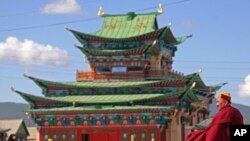Last year, China replaced Germany as Russia’s largest trading partner. Now, as Russian gas and oil pipelines increasingly point East, the Kremlin wants to convert a backwater city on the Trans-Siberian Railway into Asia’s door to Russia.
The songs, the dances, and the Mongolian faces put an Asian stamp on this old Russian city that's on the ‘Tea Trail.’
For three centuries, Ulan Ude was an accident of empire. Buryat nomads - the northernmost Mongolian people - living inside the borders of Russia.
Kremlin focuses on Asia
Now Asia is booming, and the Kremlin is looking east.
Prime Minister Vladimir Putin flew five time zones east of Moscow to tell Buryatia leaders they will play a strategic role in building Russia’s ties with Asia. Their mission is to build an Asian-friendly port of entry to Russia.
Putin said that without a doubt, the entry of Buryatia into Russia had very serious geopolitical significance, it helped to strengthen the eastern borders of the country and Russia's presence in Asia.
The leaders gathered to mark 350-year anniversary of Buryatia joining Russia.
Behind the singing and dancing was geopolitics.
Upgrading the infrastructure
Russia’s finance Minister Alexei Kudrin came to say the Kremlin is spending half a billion dollars to upgrade roads, airports and hotels to give Asian tourists international standard access to Lake Baikal.
As visiting Chinese reporters took note, Kudrin said that Ulan Ude will host finance ministers from 21 Pacific Rim nations at next year’s Asia-Pacific Economic Cooperation meeting. With the ministers, Kudrin said, will come hundreds of Asian journalists, and hopefully Asian tourism and investment.
He hailed Ulan Ude as the center of Buddhism in Russia. He said in order to have a development vector from Asia into Russia, the leaders need to show there is a rich tradition connecting Russia with other regions represented in APEC, and most importantly with South East Asia.
Religious, ethnic tolerance
Not only is Buryatia in the same time zone as Japan and Korea, but the republic is in the same spiritual zone - one of religious tolerance.
This is often absent in European Russia, where racist gangs have attacked Asian men in recent years. On Monday, a court in Moscow handed down life sentences to five local neo-Nazis convicted in the murders of 27 non-Russians in the Moscow area during a two year period.
In contrast, since the collapse of the Soviet Union 20 years ago, about 10,000 Chinese have moved to Buryatia to live and work. Many say they find Ulan Ude to be Asian-friendly.




